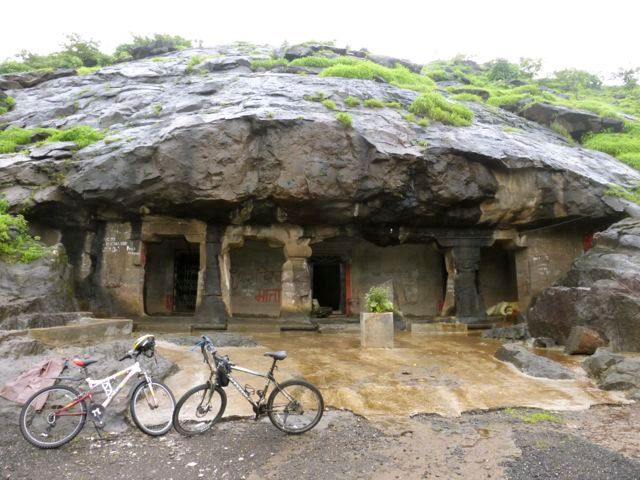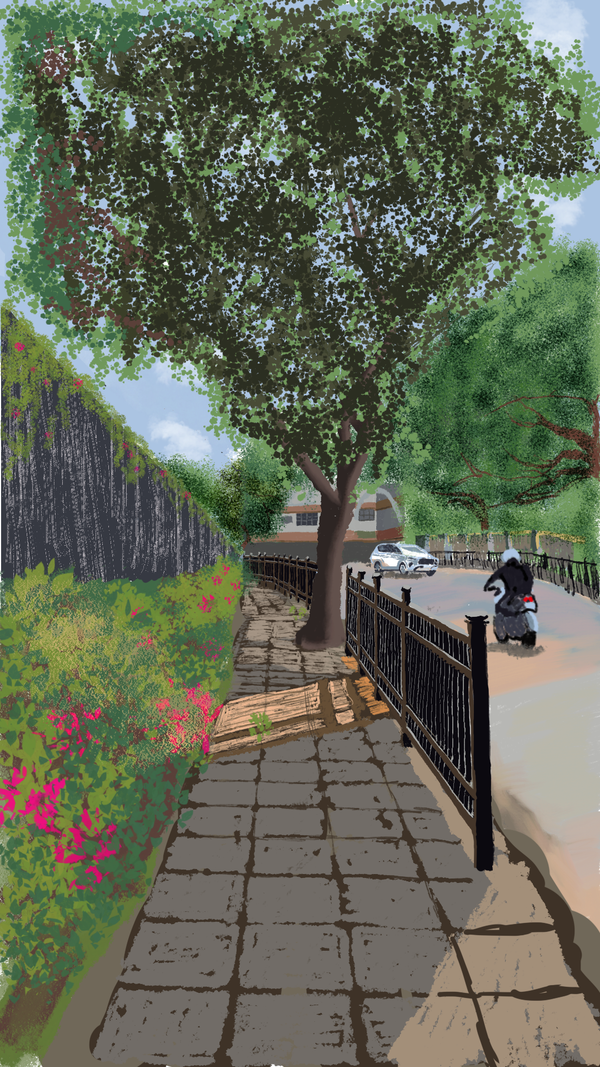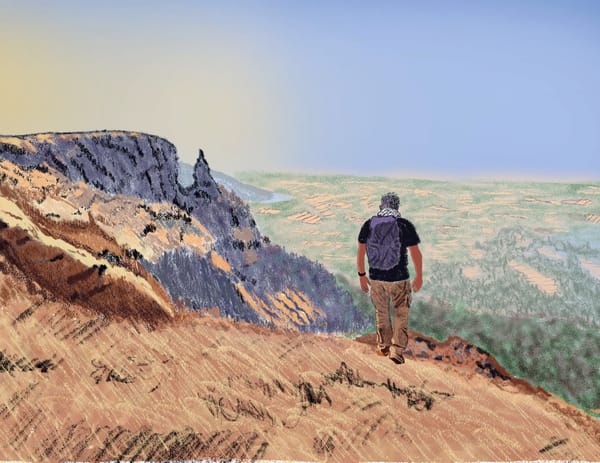Cycling to Lonad Caves and Shiva Temple, Thane
Last month, some cyclists had visited Lonad to do tree planting, and I could not join them. But ever since, Lonad was on my mind due to the caves that are found there. This weekend, I got a chance to visit Lonad with Jp Shetty, a cyclist friend from Thane. We both had planned to visit Pune this weekend for the Fort Conservation Conference (Durg Sanvardhan Sammelan) and decided to grab a quick ride in the morning before heading out to Pune.
Lonad caves are located just north of Kalyan on the outskirts of Thane district, near a village called Janwal. The caves were built in the 5th century for monks who traveled from the port of Nala Sopara – a major port on the western coast at the time – to Junnar, the capital of the Satavahana kingdom ruled by King Satakarni. The cave is now converted into a temple but the carvings and inscriptions bear testimony to its Buddhist origins.
I started cycling from Andheri at 5:30 am and Jp Shetty joined me at Thane, and we proceeded to Lonad along the Mumbai Nashik highway. There is a prominent right turn towards Janwal or Bhawale village about 5 km after the Kalyan junction. This is a properly concretized road and we pass All Saints High School, and then Hariyali nursery. There is a trail on the left that goes towards Lonad Caves.
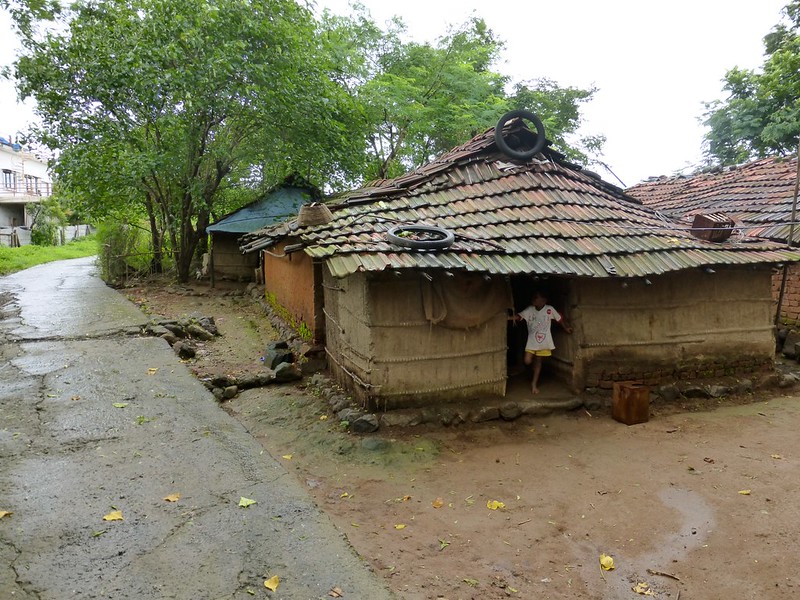 At the start of the trail towards the caves, there is a small temple and a few mud huts. The trail is concretized and is slippery when wet in the monsoon. There is a good gradient and so you have to ride carefully up the hill
At the start of the trail towards the caves, there is a small temple and a few mud huts. The trail is concretized and is slippery when wet in the monsoon. There is a good gradient and so you have to ride carefully up the hill
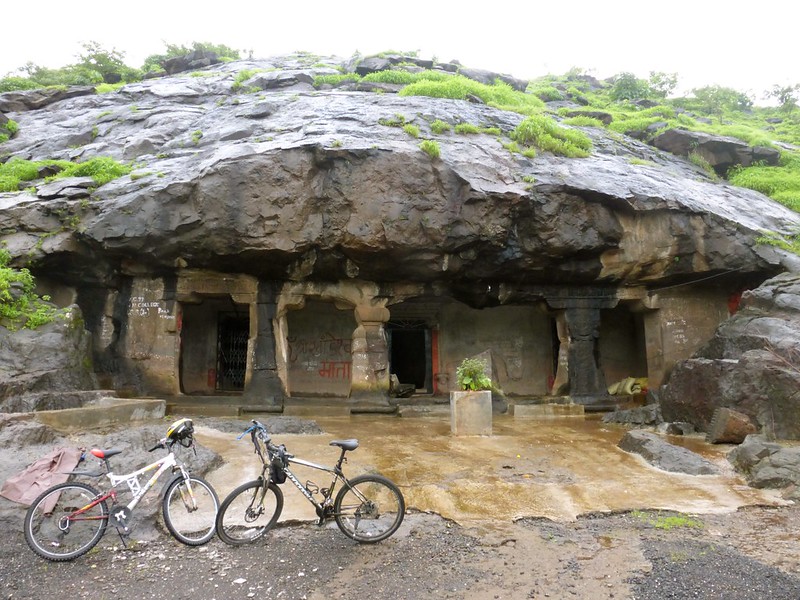 At the end to the trail, we reached the caves located midway up the hill. There is a broad ledge outside the caves where we parked the cycles. There is a tulsi plant outside that seems to be a recent addition.
At the end to the trail, we reached the caves located midway up the hill. There is a broad ledge outside the caves where we parked the cycles. There is a tulsi plant outside that seems to be a recent addition.
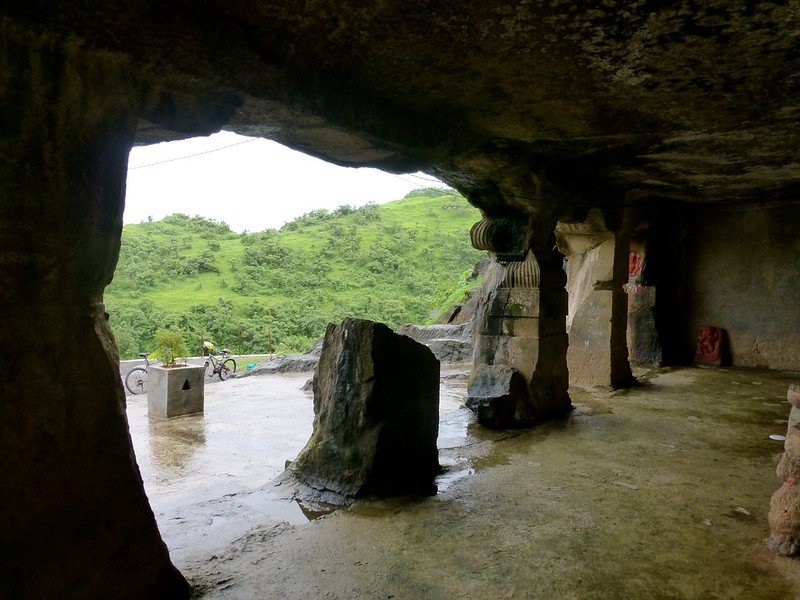 There is an outer verandah with four pillars of which one is broken. The pillars must have been very ornately carved, as one of the pillars’ remnants indicate.
There is an outer verandah with four pillars of which one is broken. The pillars must have been very ornately carved, as one of the pillars’ remnants indicate.
 Just above the pillars, there is a series of carved panels that depict the Jataka tale of Vishwantara (Vessantara), the benevolent and charitable Bodhisattva. Vishwantara was born in the kingdom of Jetuttara ruled by King Sanjaya. He was born along with a white elephant named Pacchaya, with magic powers to make rainfall. Renowned for being extremely charitable, Vishwantara gave away the elephant to eight Bramhins from a neighboring kingdom who deviously came to seek his help for saving them from a drought. The people of Jetuttara were upset at losing the magic elephant, and forced King Sanjaya to banish Vishwantara to the forests.
Just above the pillars, there is a series of carved panels that depict the Jataka tale of Vishwantara (Vessantara), the benevolent and charitable Bodhisattva. Vishwantara was born in the kingdom of Jetuttara ruled by King Sanjaya. He was born along with a white elephant named Pacchaya, with magic powers to make rainfall. Renowned for being extremely charitable, Vishwantara gave away the elephant to eight Bramhins from a neighboring kingdom who deviously came to seek his help for saving them from a drought. The people of Jetuttara were upset at losing the magic elephant, and forced King Sanjaya to banish Vishwantara to the forests.
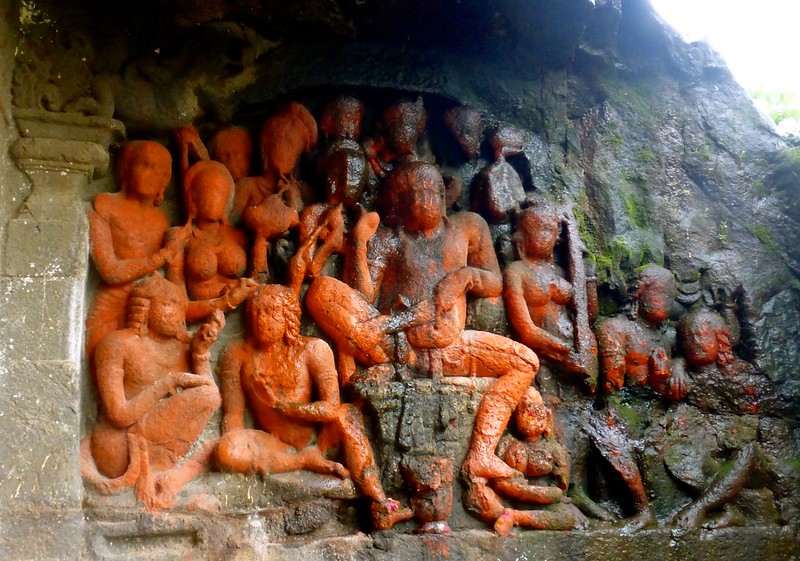 by ashubij, on Flickr")On the right wall outside the pillars, there is a large carved fresco that also depicts a scene from the Vishwantara jataka tale. This is the scene of King Sanjaya who banishes Vishwantara in response to the complaints from his subjects.
by ashubij, on Flickr")On the right wall outside the pillars, there is a large carved fresco that also depicts a scene from the Vishwantara jataka tale. This is the scene of King Sanjaya who banishes Vishwantara in response to the complaints from his subjects.
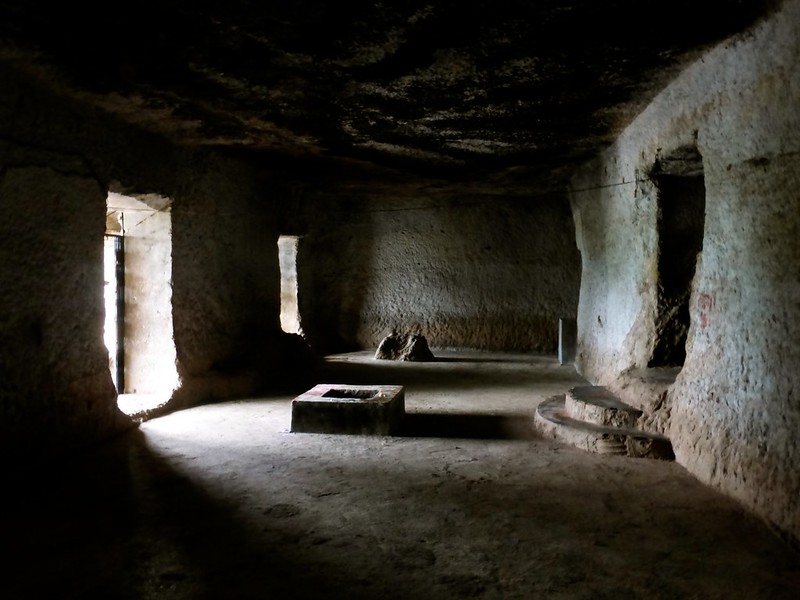 From the verandah, three openings lead to the internal chamber. The opening in the center looks like the main entrance, and the ones on both the sides are also big enough to enter through. The chamber is largely bare. In the center a rectangular yagna kund or holy fireplace that seems to be constructed in recent times. Towards the left end of the chamber, there are two mounds of rock that seem to be the remnants of some statue or structure
From the verandah, three openings lead to the internal chamber. The opening in the center looks like the main entrance, and the ones on both the sides are also big enough to enter through. The chamber is largely bare. In the center a rectangular yagna kund or holy fireplace that seems to be constructed in recent times. Towards the left end of the chamber, there are two mounds of rock that seem to be the remnants of some statue or structure
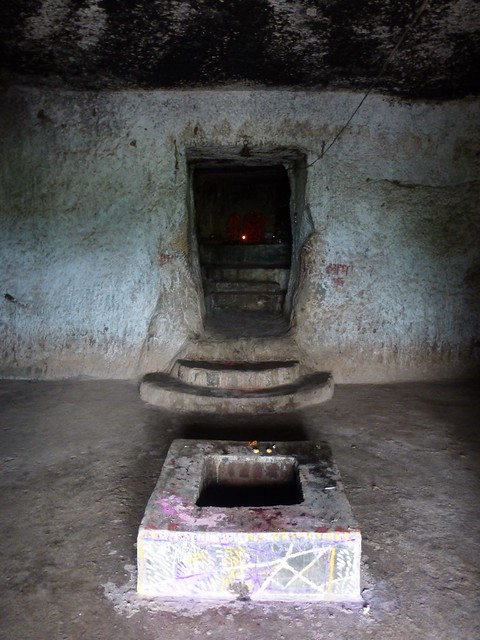 In the center of back wall of the outer chamber, there is a door in the center that leads to the inner chamber or inner sanctum
In the center of back wall of the outer chamber, there is a door in the center that leads to the inner chamber or inner sanctum
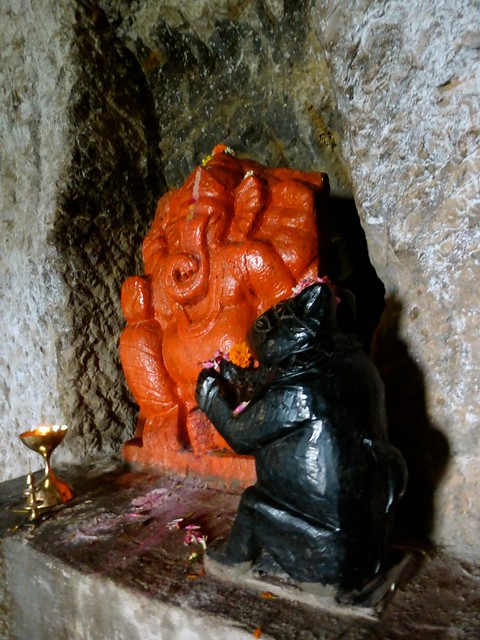 On the two extreme ends of the back wall on either side of the central door, there are rectangular cut-outs with idols of Gods. On the right is the idol of Ganesh with a large mouse – Ganesh’s vehicle of choice – on the left the idol is unidentifiable.
On the two extreme ends of the back wall on either side of the central door, there are rectangular cut-outs with idols of Gods. On the right is the idol of Ganesh with a large mouse – Ganesh’s vehicle of choice – on the left the idol is unidentifiable.
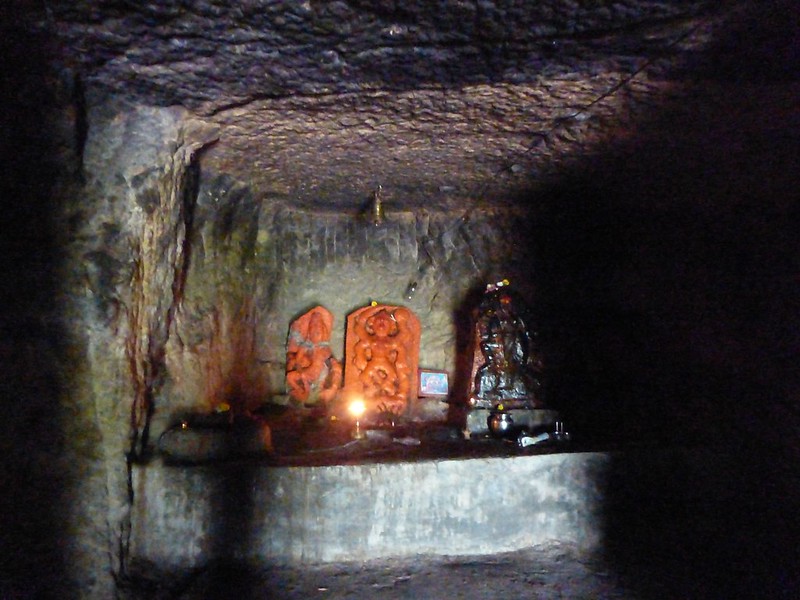 The inner chamber is a small sanctum with dieties of Khandeshvari Devi and Mahishasura Mardini. The idols are placed on a platform that seems to be a new construction.
The inner chamber is a small sanctum with dieties of Khandeshvari Devi and Mahishasura Mardini. The idols are placed on a platform that seems to be a new construction.
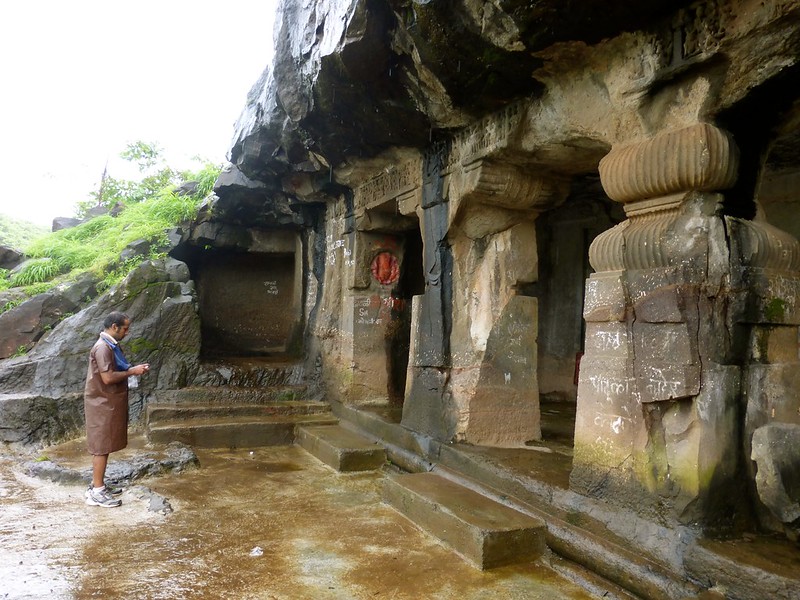 Having explored the inside of the cave, we noticed a water tank on the extreme right on the outside. We were wondering if there were any more caves up above this cave
Having explored the inside of the cave, we noticed a water tank on the extreme right on the outside. We were wondering if there were any more caves up above this cave
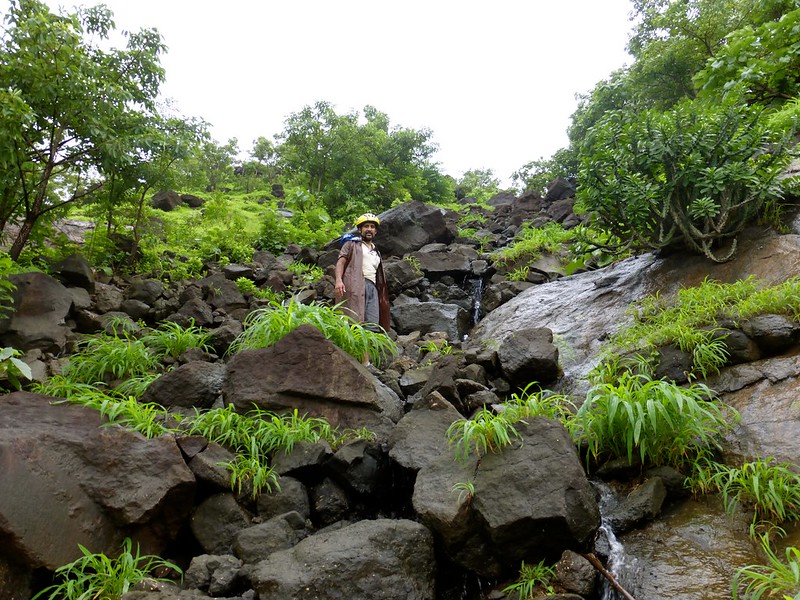 We found this rocky stream leading up the hill and gingerly made our way through the moss covered slippery rocks
We found this rocky stream leading up the hill and gingerly made our way through the moss covered slippery rocks
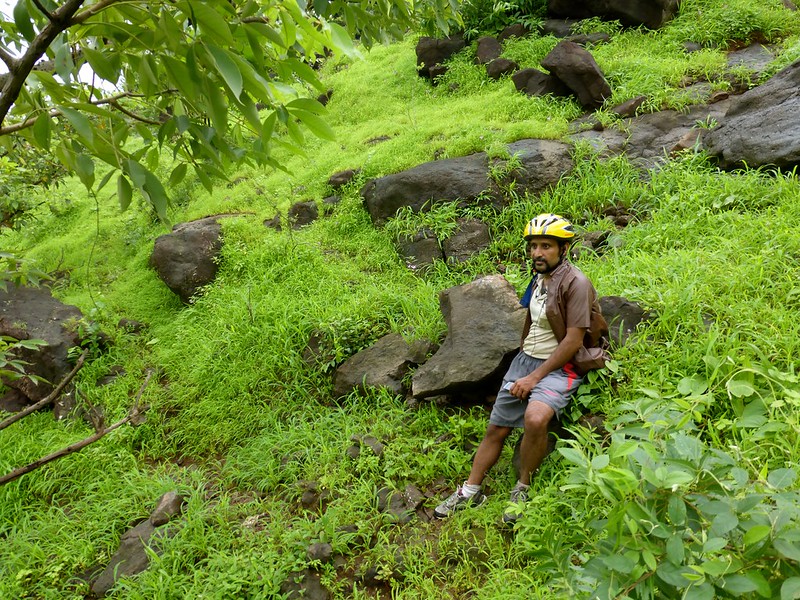 Near the top of the hill, we branched out to the left towards what looked like a big rocky patch with a possible cave, but there were no more caves. So we took a short break to admire the greenery and wild flowers around
Near the top of the hill, we branched out to the left towards what looked like a big rocky patch with a possible cave, but there were no more caves. So we took a short break to admire the greenery and wild flowers around

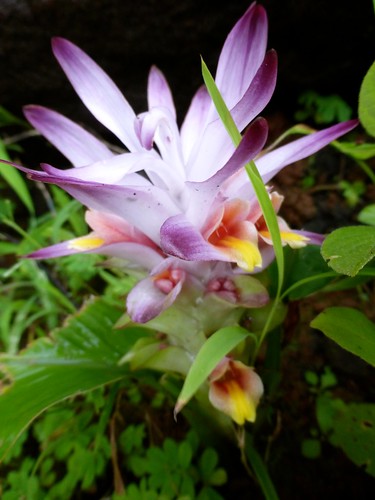 When we were trekking up the hill, we found many wild flowers. The first one is actually very small – less than a cm in size. The second one is a wild ginger plant with bright fluorescent colors
When we were trekking up the hill, we found many wild flowers. The first one is actually very small – less than a cm in size. The second one is a wild ginger plant with bright fluorescent colors
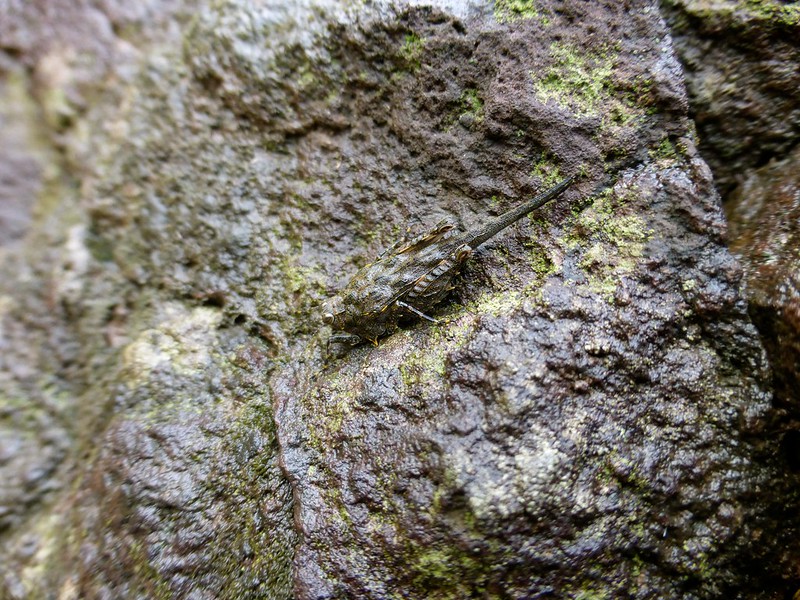 On the way back down hill, Jp spotted this cricket on a rock that camouflaged itself so well that it was difficult to make it out with the naked eye
On the way back down hill, Jp spotted this cricket on a rock that camouflaged itself so well that it was difficult to make it out with the naked eye
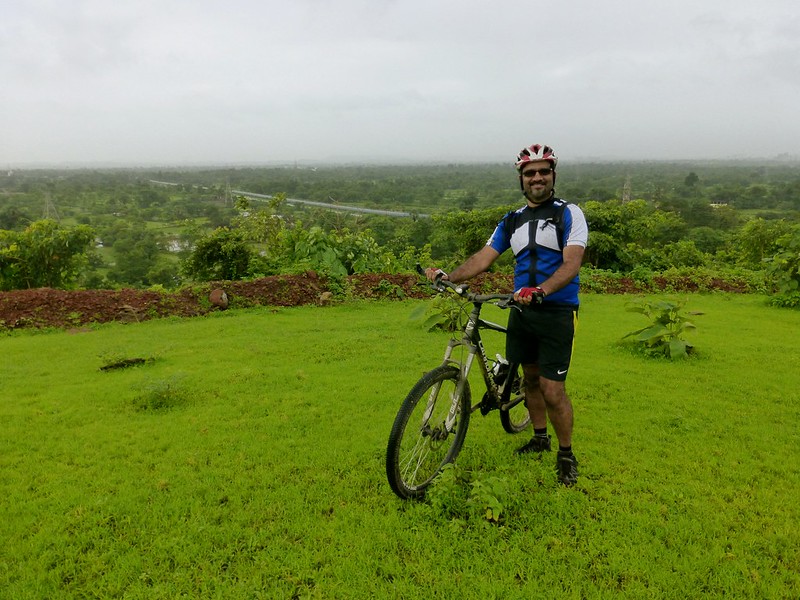 As we made our way down from the caves, we stopped by on this grassy meadow beside the trail
As we made our way down from the caves, we stopped by on this grassy meadow beside the trail
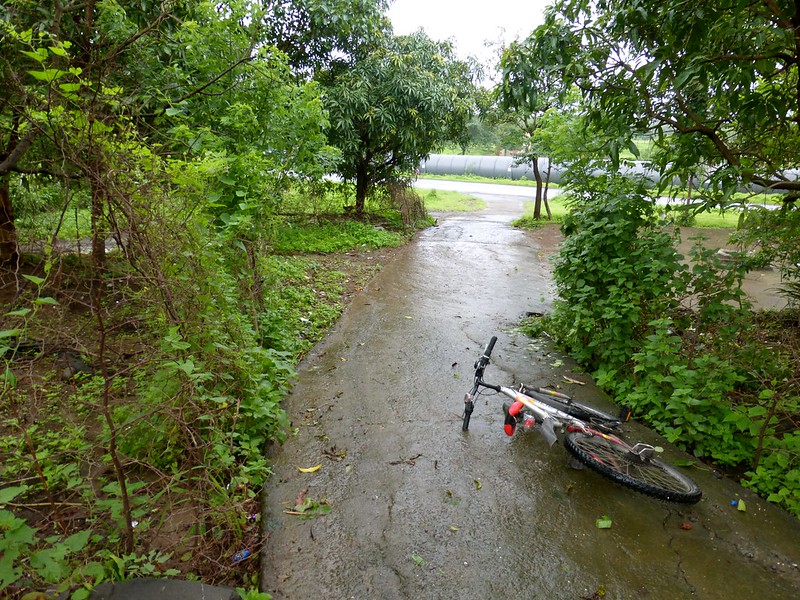 The trail was slippery and wet and also has a relatively steep gradient. On our way back, Jp had a small fall but luckily was not injured.
The trail was slippery and wet and also has a relatively steep gradient. On our way back, Jp had a small fall but luckily was not injured.
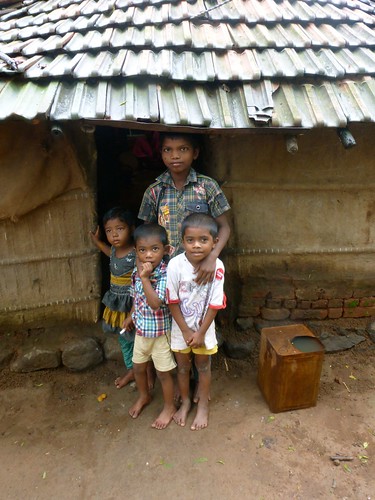
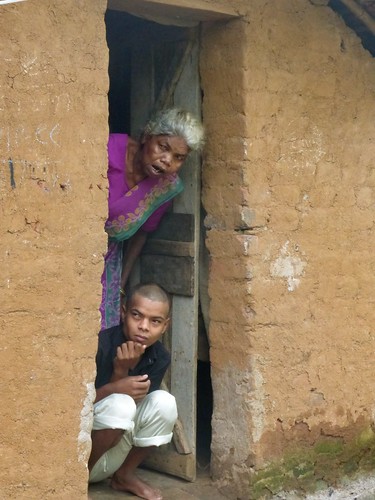 We met the inhabitants of the mud huts. In the left hut were this cute bunch of kids, and on the right lived the family of the priest who presides over the temple next door
We met the inhabitants of the mud huts. In the left hut were this cute bunch of kids, and on the right lived the family of the priest who presides over the temple next door
Our next destination was the Shiva Temple in Lonad village. The temple is presumably built around the first century AD, when Thane and other northern Konkan was ruled by the Shilaharas. The Shilaharas were Shiva worshippers. The earliest known reference to this temple is in an inscription in Vasai, dated in Shaka 1083 (A. D. 1161). It records the jirnoddhara (repairs) of a temple of Shiva and the gift of a garden in Lona (modern Lonad) to an Upadhyaya which mentions the Shiva temple and a garden being gifted to a local chieftan or Upadhyaya in Lonad (ref).
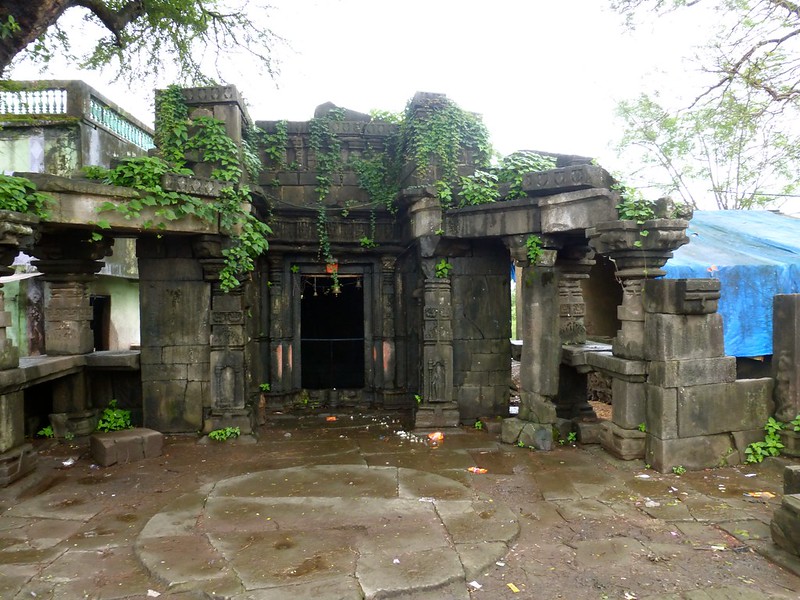 The temple is still used by the residents of Lonad, and there is a municipal school just oppositte the temple. Most of the outer structure of the temple is destroyed. Only the inner sanctum is still in tact. Even the dome above is not present any more. The temple is adorned with intricately carved pillars and panels above the doorway to the inner sanctum.
The temple is still used by the residents of Lonad, and there is a municipal school just oppositte the temple. Most of the outer structure of the temple is destroyed. Only the inner sanctum is still in tact. Even the dome above is not present any more. The temple is adorned with intricately carved pillars and panels above the doorway to the inner sanctum.
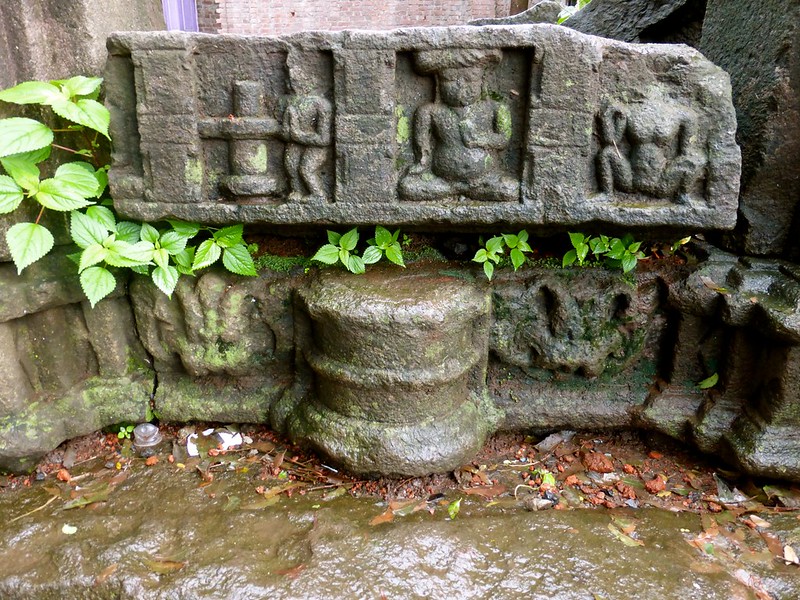 There are two small doorways on the two sides of the temple leading to cells on either side. In the right cell, there is a broken Shiva Linga, while on the right, there is this carved panel with various figures.
There are two small doorways on the two sides of the temple leading to cells on either side. In the right cell, there is a broken Shiva Linga, while on the right, there is this carved panel with various figures.
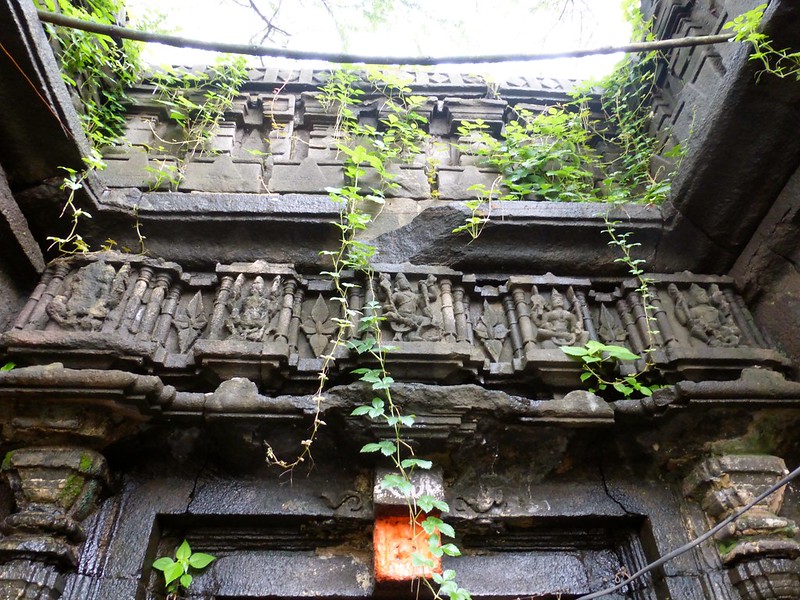 Above the door to the inner sanctum, there are intricately carved panels depicting Shiva in various positions
Above the door to the inner sanctum, there are intricately carved panels depicting Shiva in various positions
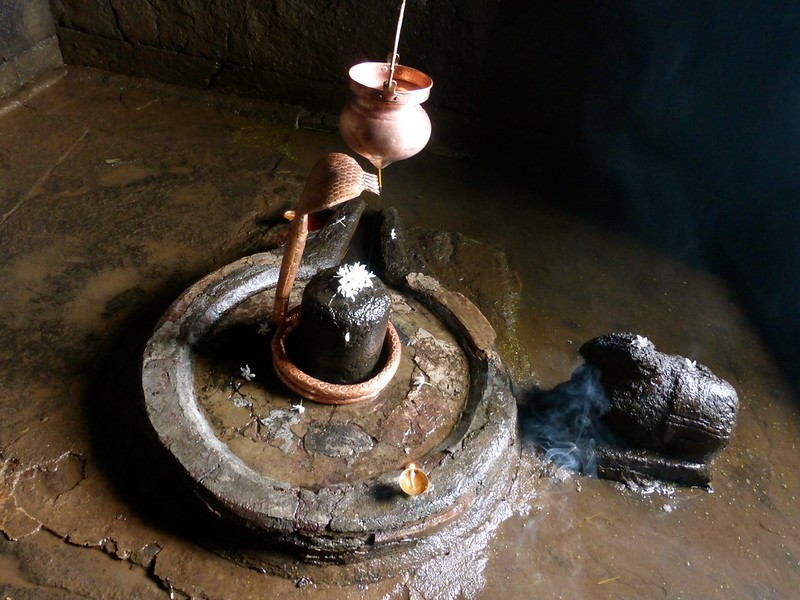 In the inner sanctum of the temple, there is a Shiva Linga and Nandi in the center and in one corner there is a small Ganesh idol. The residents of Lonad regularly visit the temple and keep the temple as clean as is practically possible. The inner sanctum is thankfully well maintained.
In the inner sanctum of the temple, there is a Shiva Linga and Nandi in the center and in one corner there is a small Ganesh idol. The residents of Lonad regularly visit the temple and keep the temple as clean as is practically possible. The inner sanctum is thankfully well maintained.
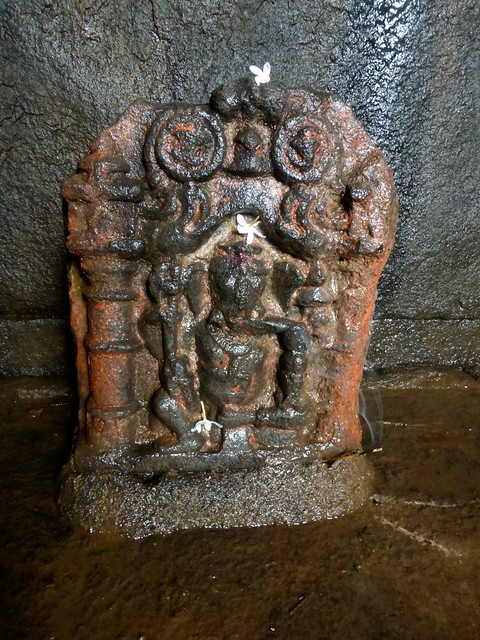 In the corner of the inner sanctum is placed this beautifully carved idol of Lord Ganesh
In the corner of the inner sanctum is placed this beautifully carved idol of Lord Ganesh
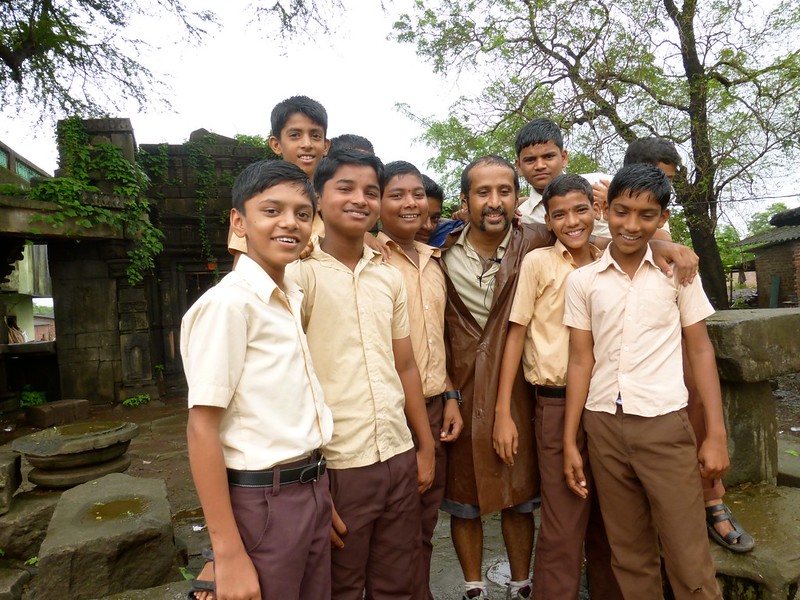 While we were admiring the temple, the municipal school concluded its morning session, and a bunch of kids came out to the temple. We spent some time chatting with them and they were as usual quite curious about where we came from and our fancy bicycles.
While we were admiring the temple, the municipal school concluded its morning session, and a bunch of kids came out to the temple. We spent some time chatting with them and they were as usual quite curious about where we came from and our fancy bicycles.
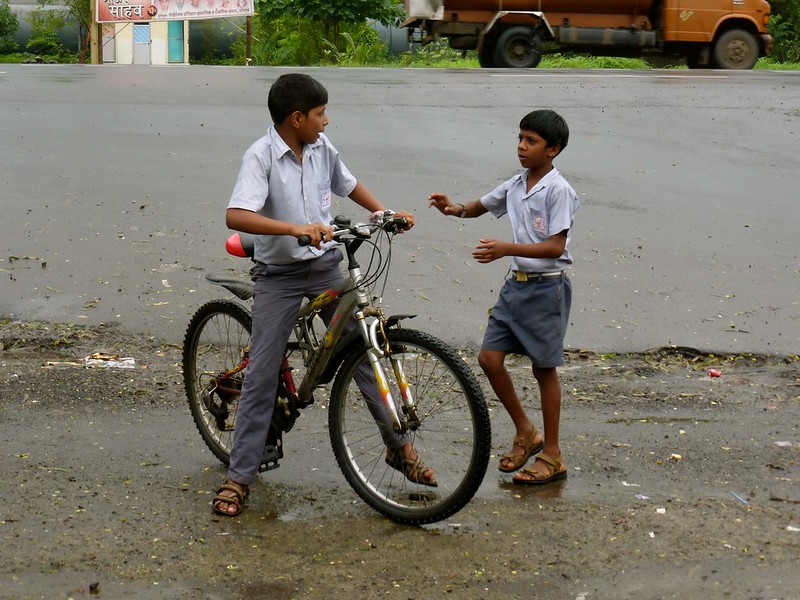 On the way back from Lonad, we took the internal road that cuts through various villages. The road is narrow but the surface is quite good with just a few patches of potholes. It was great to see the countryside bloom in the monsoon. When we hit the highway just before Kalyan junction, we stopped for some tea at a street side vendor. A bunch of kids came around and took a ride on Jp’s cycle.
On the way back from Lonad, we took the internal road that cuts through various villages. The road is narrow but the surface is quite good with just a few patches of potholes. It was great to see the countryside bloom in the monsoon. When we hit the highway just before Kalyan junction, we stopped for some tea at a street side vendor. A bunch of kids came around and took a ride on Jp’s cycle.
After the hot tea and some bananas to rejuvenate us, we headed back on the highway back to Thane and then I went on back to Andheri. I reached home around 12:30 pm, just in time to get a quick shower before I and Jp headed out to Pune for the Fort Conservation Conference (Durg Sanvardhan Sammelan).
The total distance covered on this ride was just above 90 km from Andheri and back. Had a great time on this ride, and as usual without any planning. But the big learning from this ride was the history of northern Konkan and especially Thane, which goes back to the early part of the first century and before. The entire ancient history of Thane is described in detail in the Thane District Gazetteer
The route map:

